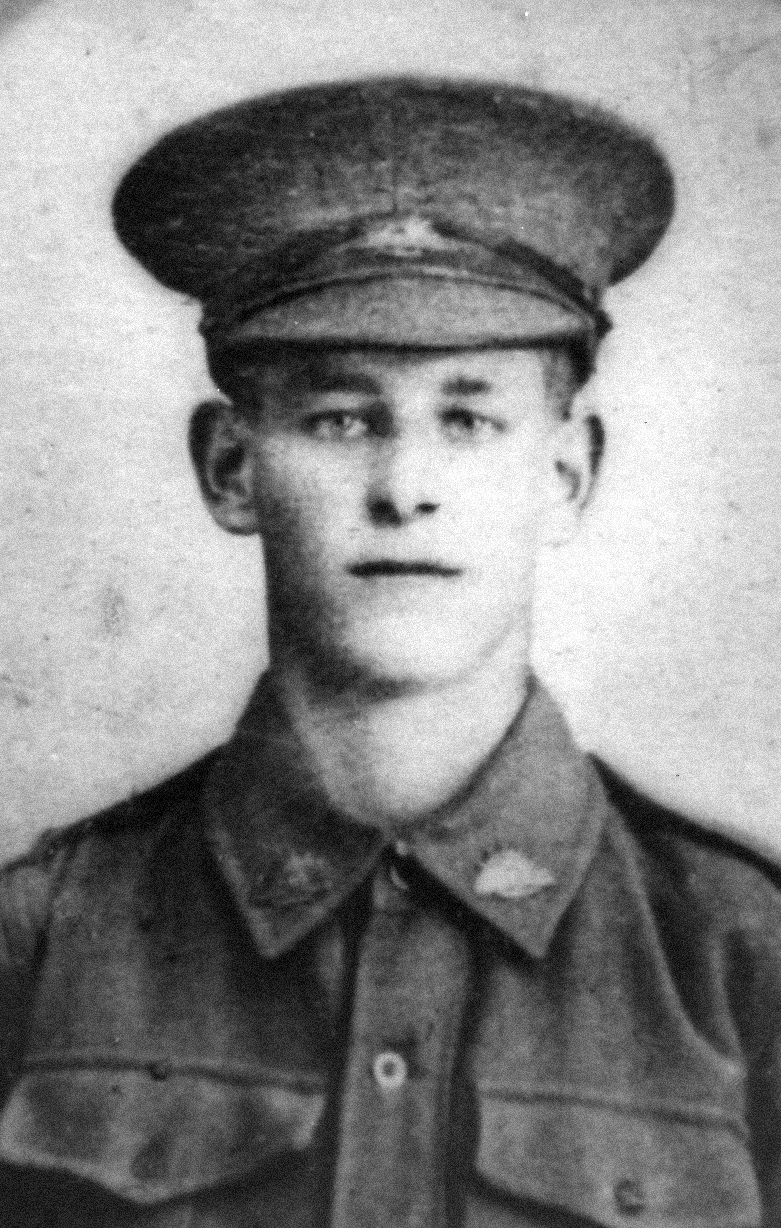Pte
Clifford Tickner
Information about birth
|
Year of birth: 1897 |
|
Place of birth: Bungonia, New South Wales, Australia |
General information
|
Last known residence: Tallong, New South Wales, Australia |
|
Profession: Orchardist |
|
Religion: Church of England |
Army information
|
Country: Australia |
|
Force: Australian Imperial Force |
|
Rank: Private |
|
Service number: 5469 |
|
Enlistment date: 11/11/1915 |
|
Enlistment place: Goulburn, New South Wales, Australia |
|
Units: — Australian Infantry, 53rd Bn. (Last known unit) |
Information about death
|
Date of death: 26/09/1917 |
|
Place of death: Butte, Polygon Wood, Belgium |
|
Cause of death: Killed in action (K.I.A.) |
|
Age: 20 |
Cemetery
|
Buttes New British Cemetery, Polygon Wood Plot: XVIII Row: C Grave: 2 |
Distinctions and medals 2
|
British War Medal Medal |
|
Victory Medal Medal |
Points of interest 4
| #1 | Place of birth | ||
| #2 | Last known residence | ||
| #3 | Enlistment place | ||
| #4 | Place of death (approximate) |
My story
Private Clifford Tickner served in the Australian Infantry 53rd Battalion, part of the 14th Australian Brigade, of the 5th Australian Division. The Australian Infantry 53rd Battalion participated in the Battle of Polygon Wood on the 26th of September 1917. The 14th Australian Brigade attacked with the 53rd Battalion; the 56th and 55th Battalions were in support.
At 5.50 a.m., zero hour, the men of the 53rd advanced through Polygon Wood behind a creeping barrage. Their objective was the Butte in Polygon Wood. The advance went well and the Battalion rushed and captured a German strongpoint on the way. After slight fighting they managed to establish themselves on the Butte. Bombing parties were sent down the dugouts to clear the Butte. The objective was reached and cleared at 6.25 a.m. and the companies consolidated their positions under cover of a barrage. The attack was then taken up by the 56th and 55th Battalion. In order to consolidate their position the 53rd Battalion sent out several patrols in and around the Butte to deal with individual snipers and German positions.
The Battalion had consolidated in depth but owing to heavy shell fire on all back areas and heavy casualties the parties had to be brought forward to the Red Line.
Private Clifford Tickner fell during the Battle of Polygon Wood on the 26th of September 1917. According to witness testimonies in his Red Cross Wounded and Missing File Private Clifford Tickner was killed by a piece of shell during the capture of the Butte. He was initially buried at the Butte in Polygon Wood, close to where he fell. Clifford Tickner’s remains were exhumed after the war and were interred in Buttes New British Cemetery, Polygon Wood.
At 5.50 a.m., zero hour, the men of the 53rd advanced through Polygon Wood behind a creeping barrage. Their objective was the Butte in Polygon Wood. The advance went well and the Battalion rushed and captured a German strongpoint on the way. After slight fighting they managed to establish themselves on the Butte. Bombing parties were sent down the dugouts to clear the Butte. The objective was reached and cleared at 6.25 a.m. and the companies consolidated their positions under cover of a barrage. The attack was then taken up by the 56th and 55th Battalion. In order to consolidate their position the 53rd Battalion sent out several patrols in and around the Butte to deal with individual snipers and German positions.
The Battalion had consolidated in depth but owing to heavy shell fire on all back areas and heavy casualties the parties had to be brought forward to the Red Line.
Private Clifford Tickner fell during the Battle of Polygon Wood on the 26th of September 1917. According to witness testimonies in his Red Cross Wounded and Missing File Private Clifford Tickner was killed by a piece of shell during the capture of the Butte. He was initially buried at the Butte in Polygon Wood, close to where he fell. Clifford Tickner’s remains were exhumed after the war and were interred in Buttes New British Cemetery, Polygon Wood.
Sources 3
|
53rd Australian Infantry Battalion, (Australian War Memorial, Campbell (AWM), AWM4 23/70/14). https://www.awm.gov.au/collection/C1338583 Sources used |
|
First Australian Imperial Force Personnel Dossiers, 1914-1920, (National Archives of Australia, Canberra (NAA), B2455, TICKNER C). http://recordsearch.naa.gov.au/SearchNRetrieve/Interface/SearchScreens/BasicSearch.aspx Sources used |
|
McCarthy C., The Third Ypres Passchendaele. The Day-by-Day Account, (London, Arms & Armour Press, 1995), pg. 85-88. Sources used |
More information 4
|
Commonwealth War Graves Commission Database https://www.cwgc.org/find-records/find-war-dead/casualty-details/480474 |
|
Namenlijst (In Flanders Fields Museum) https://namenlijst.org/publicsearch/#/person/_id=d0ab8e07-f68c-47bc-ae31-945877c5309a |
|
Lives of the First World War (Imperial War Museum) https://livesofthefirstworldwar.iwm.org.uk/lifestory/7631815 |
|
The AIF Project (UNSW Canberra) https://aif.adfa.edu.au/showPerson?pid=301190 |
